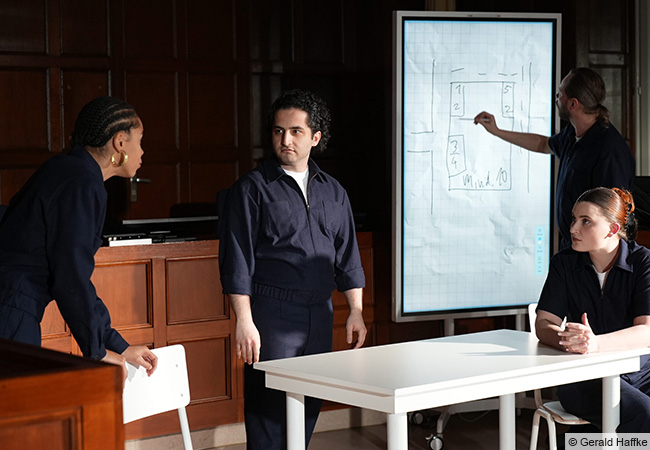More in-person events, especially for the introductory and conclusion phases, for laboratory work, rehearsals and discourse
In-person operations at Hessian Universities will be extended with caution during the Winter 2020/2021 semester. Since at universities – in contrast to schools – many people in changing groups participate in completely different events, special protective rules for corona continue to be necessary, preventing a complete return to normal operations for the time being. The coming winter semester will therefore be a hybrid semester, i.e., a combination of in-person and online teaching. In coordination with the university executive boards, the Ministry of Higher Education, Research and the Arts has developed a concept to this effect.
Places for learning together
“Universities are places for learning together – this should be lived in in-person formats whenever justifiable from a hygiene perspective and organisationally feasible,” explains Hessian Minister of Science Angela Dorn. “I am very happy that with a lot of work and creativity, the Hessian universities already managed to do a good job organising study and research operations under difficult conditions. Based on interim results to date, both digital teaching and the carrying out of exams have functioned well overall. My sincere thanks for this success go to everyone at the universities, the lecturers and professors, the employees in organisation and technology, and the students.”
Not all events in-person
„Because the corona pandemic continues to pose special challenges on spatial conditions, for example regarding distancing, sanitising and routes, not all events will be able to take place in person in the coming winter semester,” continues Minister Dorn. “The experience universities have gained with digital formats are very valuable for improving on-line teaching, which continues to be necessary. In deciding which events can take place in person, the universities will orient themselves on students being able to reach their qualification goals in the best way possible. This means that certain groups of students and event formats have priority. This includes beginning students and students who are in the final phase of their studies. It also includes students with a high requirement for in-person events such in laboratories, in the areas of art and music, in project work and sports. Events that are not possible without direct discourse, such as tutorials and seminars, are also in focus.
Better equipped than at the start of the pandemic
The Chair of the Konferenz Hessischer Universitätspräsidien (Conference of Hessian university executive boards) and Goethe University President Professor Dr Birgitta Wolff, says: “Fortified by diverse experiences from organising digitally supported teaching in the summer semester, Hessian universities are significantly better equipped for the coming winter semester than at the start of the pandemic. We also recognise that there can be no ‘one-size-fits-all” solution for Hessian universities. It is helpful, therefore, that the state is providing a framework for the organisation of teaching in the winter semester in order to improve planning security on the one hand, and on the other is taking the different university profiles, discipline cultures and individual spatial, technical and administrative options into consideration. The most important thing is that we don‘t lose our students.
Continuing development of online formats
“Hesse’s universities for applied sciences want to use this winter semester as opportunity to continue developing the online formats for teaching and at the same time to cautiously return to academic in-person operations. We strive for direct exchange between teachers and students wherever it makes sense and is justifiable – for example, in laboratory work in small groups, which plays a central role at every university of applied science in teaching practical qualifications, and in manageable introductory events for new students,” explains Prof. Dr. Matthias Willems, President of the Technischen Hochschule Mittelhessen and Chair of the HAW Hessen.
Hybrid concept for art academies
“The art academies implemented digital courses with great commitment during the summer 2020 semester to compensate the cancelled in-person courses at least somewhat and transitionally,” states Professor Bernd Kracke, President of the University for Art and Design in Offenbach in the name of the art academies.“But at the same time, it confirmed that the teaching of art and design is very difficult without proximity, direct viewing, and in-person contact. We see it as an opportunity and a challenge to expand teaching in the art academies again in the coming semester, as far as the situation allows. This requires a hybrid concept, tailored to specific needs, that combines digital and analogue courses. The focus is also on first-year students: despite corona, they should be given the best possible personal start to their studies.”
Download: Translation of hybrid concept in detail (PDF)
Source: Press Release Hessian Ministry for Higher Education, Research and the Arts







